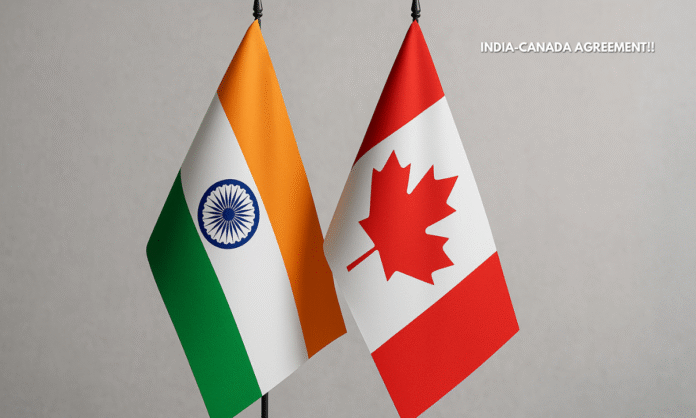India and Canada have agreed to adopt a collaborative approach towards a new chapter in bilateral ties, including working closely to combat terrorism and transnational crimes. This diplomatic breakthrough follows National Security Advisor Ajit Doval’s talks with Canadian counterpart Nathalie Drouin in New Delhi on September 18, 2025, marking the first significant step toward mending relations strained since 2023.
Key Highlights
- India and Canada NSAs agreed on strengthened security cooperation and intelligence exchanges during September 18, 2025 talks
- Both nations committed to collaborative counter-terrorism efforts and combating transnational organized crime
- The security dialogue follows up on Prime Minister Modi-Carney discussions at G7 Summit in June 2025
Security Cooperation Framework Established
The India Canada security cooperation dialogue established concrete frameworks for future cooperation after nearly two years of diplomatic tensions. Both sides acknowledged the clear momentum for rebuilding trust and expanding cooperation at the highest levels of political leadership. The National Security Advisors had productive discussions on advancing the bilateral relationship, including in areas such as counter-terrorism, combating transnational organized crime, and intelligence exchanges.
The security talks specifically addressed activities of pro-Khalistan separatists, the Hardeep Singh Nijjar killing investigation, and Indian government demands for handing over those involved in terrorism and separatist activities against India. Canada’s National Security and Intelligence Advisor Nathalie Drouin emphasized advancing a relationship based on mutual respect, the rule of law, and commitment to sovereignty and territorial integrity principles.
They agreed to strengthen India Canada security cooperation and further reinforce existing mechanisms of engagement rather than creating entirely new frameworks. The two NSAs also deliberated on priority areas for future cooperation and exchanged views on regional and global developments.
NSA Ajit Doval meeting with Canada’s NSA Nathalie G. Drouin in New Delhi was not routine diplomacy, it was a clear message. India underlined that threats to its diplomats by Khalistani radicals in Canada cannot be brushed aside as “free speech.” NSA Ajit Doval conveyed that if… pic.twitter.com/eU9b4HIHqZ
— रुद्राक्ष📿 (Rudy) (@manamuntu) September 20, 2025
Economic Relations Maintain Stability Despite Tensions
Despite diplomatic strains, India Canada security cooperation maintained parallel economic stability with bilateral trade reaching CAD $30.9 billion in 2024. India maintained its position as Canada’s seventh-largest goods and services trading partner throughout the diplomatic crisis. Canada’s merchandise exports to India were $5.3 billion in 2024, increasing by 3.3% from 2023, while imports from India totaled $8.0 billion, rising 6.6% year-over-year.
The trade relationship encompasses diverse sectors, with Canada’s top exports to India including vegetables ($1.4 billion), mineral fuels and oils ($767 million), and wood pulp ($518 million). India’s primary exports to Canada featured pharmaceutical products ($852 million), machinery ($807 million), and electronics ($640 million).
Services trade showed even stronger performance, with Canada’s exports to India reaching $16.1 billion and imports from India totaling $3.5 billion in 2024. Foreign Direct Investment equity inflow from Canada to India amounts to $4.17 billion from April 2000 to March 2025.
Political Leadership Drives Diplomatic Reset
The India Canada security cooperation dialogue built upon groundwork established by Prime Minister Narendra Modi and Canadian Prime Minister Mark Carney during their G7 Summit meeting in Kananaskis, Alberta in June 2025. The Modi-Carney talks represented the first high-level political engagement since diplomatic relations deteriorated following former Prime Minister Justin Trudeau’s allegations in September 2023.
Mark Carney’s election victory in April 2025 provided the political opening necessary for resetting India Canada security cooperation frameworks. Both countries appointed new envoys to their respective capitals in August 2025, with India designating Dinesh Patnaik as High Commissioner to Canada and Canada appointing Chris Cooter as High Commissioner to India.
The Canadian Security Intelligence Service’s June 2025 annual report acknowledging Khalistani extremist threats operating from Canadian soil validated India’s long-standing security concerns regarding India Canada security cooperation. The CSIS report stated that “since the mid-1980s, the politically motivated violent extremism threat in Canada has manifested primarily through Canada-based Khalistani elements seeking to use and support violent means to create an independent nation.”
Future Cooperation Areas Identified
The NSA talks identified specific priority areas for enhanced India Canada security cooperation beyond traditional security frameworks. Both sides committed to non-interference principles, including refraining from transnational repression, and agreed on the importance of reciprocal information exchange and mutual responsiveness.
Counter-terrorism cooperation will focus on addressing shared threats while respecting sovereignty principles. Intelligence exchanges will be strengthened through existing bilateral mechanisms rather than creating parallel structures. The collaborative approach includes combating transnational organized crime networks that operate across both jurisdictions.
Future ministerial-level engagements are being planned, with Canadian Foreign Minister Anita Anand likely to visit New Delhi in October 2025, marking the first high-level ministerial exchange since the diplomatic crisis began. These engagements will build upon the India Canada security cooperation framework established by the NSAs.
Closing Assessment
The September 2025 India Canada security cooperation NSA dialogue marks a pivotal moment in bilateral relations, establishing security cooperation as the foundation for broader diplomatic normalization. The collaborative approach toward counter-terrorism and transnational crime reflects both nations’ recognition that shared security challenges require coordinated responses. With economic ties maintaining stability throughout the diplomatic crisis and new political leadership in Canada providing momentum for reset, the India Canada security cooperation framework offers a pathway toward restoring the strategic partnership designation achieved in 2018.


